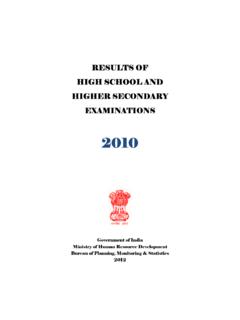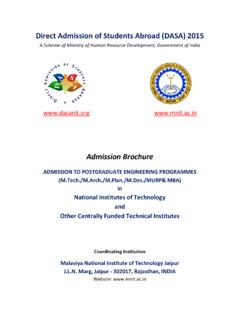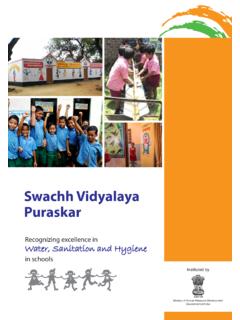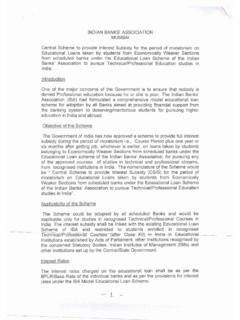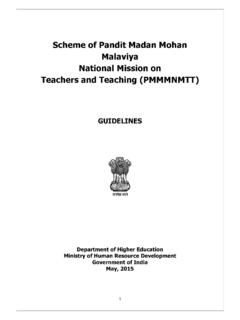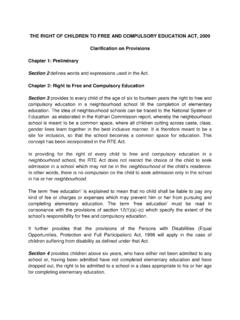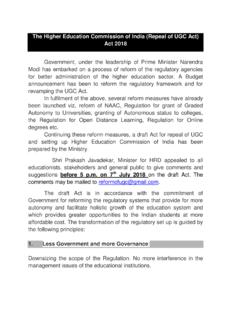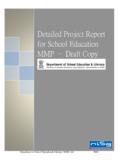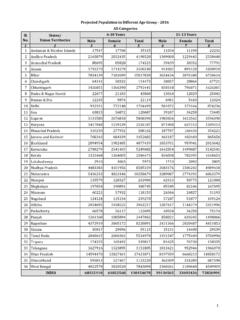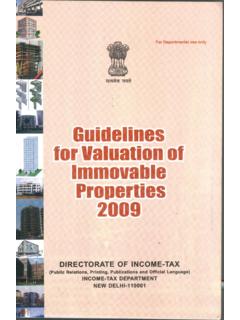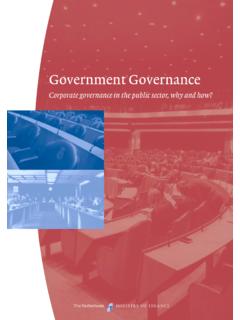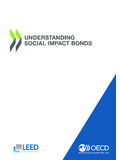Transcription of TO BE PUBLISHED IN THE GAZETTE OF INDIA …
1 TO BE PUBLISHED IN THE GAZETTE OF INDIA . EXTRAORDINARY, PART 1, SECTION 2. ministry OF finance . ( department of economic affairs ). notification . New Delhi, the 27th December, 2013. No. 8/6/2013-Invt. In pursuance of the decision of the Cabinet Commitee on Skill Development in its meeting held on 19th December, 2013, the National Skill Qualification Framework (NSQF) is hereby notified as per the following details: 1. DEFINITIONS APPLICABLE TO NSQF. i. Competence means the proven ability to use acquired knowledge, skills and personal and social abilities, in discharge of responsibility roles. It is the ability to do a job well. ii. Credit is recognition that a learner has successfully completed a prior course of learning, corresponding to a qualification at a given level. iii. Knowledge means the outcome of the assimilation of information through learning. Knowledge is the body of facts, principles, theories and practices that is related to a field of work or study.
2 Knowledge is described as theoretical and/or factual. iv. Learner refers to an individual undergoing skill development training, whether in a formal or informal setting. v. Learning Outcomes represent what a learner knows, understands and is able to do on completion of a learning process, and which would be expressed in terms of knowledge, skills and competence.;. vi. National Skills Qualifications Committee or NSQC refers to the Committee set up in accordance para 14. (i). vii. Qualification means a formal outcome of an assessment and validation process which is obtained when a competent body determines that an individual has achieved learning outcomes to given standards. 1. viii. Recognition of Prior Learning or RPL is the process of recognising previous learning, often experiential, towards gaining a qualification ix. Sector means a grouping of professional activities on the basis of their main economic function, product, service or technology x.
3 Skills means the ability to apply knowledge and use know-how to complete tasks and solve problems. Skills are described as cognitive (involving the use of logical, intuitive and creative thinking) or practical (involving manual dexterity and the use of methods, materials, tools and instruments);. xi. Trainer means someone who trains, instructs, teaches or otherwise enables the learner(s) to acquire the appropriate knowledge and skills. xii. Training Provider , Institute and Institution refer to any organisation providing knowledge and skills to learners. 2. WHAT IS THE NATIONAL SKILLS QUALIFICATION FRAMEWORK? i. The National Skills Qualification Framework (NSQF) organizes qualifications according to a series of levels of knowledge, skills and aptitude. These levels are defined in terms of learning outcomes which the learner must possess regardless of whether they were acquired through formal, non-formal or informal learning.
4 In that sense, the NSQF is a quality assurance framework. It is, therefore, a nationally integrated education and competency based skill framework that will provide for multiple pathways, horizontal as well as vertical, both within vocational education and vocational training and among vocational education, vocational training, general education and technical education, thus linking one level of learning to another higher level. This will enable a person to acquire desired competency levels, transit to the job market and, at an opportune time, return for acquiring additional skills to further upgrade their competencies. ii. The key elements of the NSQF provide: a. national principles for recognising skill proficiency and competencies at different levels leading to international equivalency b. multiple entry and exit between vocational education, skill training, general education, technical education and job markets c.
5 Progression pathways defined within skill qualification framework d. opportunities to promote lifelong learning and skill development e. partnership with industry/employers f. a transparent, accountable and credible mechanism for skill development across various sectors g. increased potential for recognition of prior learning iii. The qualification framework is beneficial to schools, vocational education and training providers, higher education institutes, accrediting authorities as well as industry and its 2. representative bodies, unions, professional associations and licensing authorities. The biggest beneficiaries of such a framework are the learners who can judge the relative value of a qualification at a particular level on the framework and make informed decisions about their career progression paths. 3. INTERNATIONAL EXPERIENCE WITH QUALIFICATION FRAMEWORKS. i. A paradigm shift from education based on inputs towards education based on learning outcomes is taking place.
6 Outcomes-based learning is a widely used term. The shift to learning outcomes is important for a number of reasons: a. It shifts focus from providers to users of education and training. b. By explaining what a learner is expected to know, understand or be able to do at the end of a learning process, individuals are better able to see what is offered in a particular course and how this links with other courses and programs. c. It increases transparency and strengthens accountability of qualifications for the benefit of individual learners and employers. The vast majority of the world's industrialized and transition countries are reforming their qualifications, while at the same time developing frameworks to relate these qualifications to each other and to generally reflect new demands in society and the labour market. The development of these systems is often linked to changes in higher education, technical and vocational education and training (TVET) and lifelong learning.
7 Ii. Many countries worldwide are in the process of introducing qualification frameworks. Though the theoretical principles of all frameworks remain largely similar, the objectives of launching the frameworks vary. Whether the emphasis is on increasing the relevance and flexibility of education and training programs, easing recognition of prior learning, enhancing lifelong learning, improving the transparency of qualification systems, creating possibilities for credit accumulation and transfer, or developing quality assurance systems, Governments are increasingly turning to qualifications frameworks as a policy tool for reform. In some cases national developments are propelled by the emergence of regional frameworks (such as the European Qualification Framework). In many cases the implementation of qualification frameworks has been widely supported by international organizations and is often linked to aid money and even loans.
8 There is increasing activity from international agencies in the area of qualifications frameworks: the Organisation for economic Cooperation and Development (OECD), the International Labour Office (ILO), the World Bank (WB) and the European Union (EU) have current qualification framework projects. 4. BACKGROUND OF DEVELOPMENT OF QUALIFICATION FRAMEWORK IN. INDIA . i. Through the National Policy on Skill Development, 2009, INDIA recognized the need for the development of a national qualification framework that would transcend both general education and vocational education and training. The Policy envisioned that the framework will stimulate and support reforms in skills development and facilitate establishment of nationally standardized and acceptable, and internationally comparable qualifications. In the absence of an organization at the Central level to develop such a framework, individual Ministries started working on development of the framework, which were to subsequently be subsumed in the National framework, when available.
9 The ministry of Labour and 3. Employment developed the National Vocational Qualifications Framework (NVQF) and the ministry of Human Resource Development developed the National Vocational Educational Qualification Framework (NVEQF). The ministry of Human Resource Development also launched a pilot of the NVEQF in Haryana at the secondary school level. ii. Realizing the need to have a unified framework, an Inter-Ministerial Committee was formed by the Cabinet Secretariat to use the work already done by the two Ministries as the foundation of the National Skills Qualification Framework. With the formation of the National Skill Development Agency, the mandate to anchor and operationalize the NSQF to ensure that quality and standards meet sector specific requirements was transferred to the Agency. 5. NEED FOR QUALIFICATION FRAMEWORK IN INDIA . i. In INDIA , general education and vocational education & training have been operating as separate verticals, with very little interaction between the two.
10 This has led to hesitation amongst the youth in opting for vocational education and training as it is presumed that this avenue would preclude the concerned individual from being able to acquire higher degrees and qualifications. In order to facilitate mobility from vocational to general education, and vice-versa, a qualification framework for INDIA , the National Skill Qualification Framework (NSQF) will help make qualifications more understandable and transparent. ii. The need for the NSQF arises due to the following additional reasons: a. Till now the focus of education and training has been almost entirely on inputs. The NSQF is based on an outcomes-based approach, and each level in the NSQF is defined and described in terms of competency levels that would need to be achieved. Job roles corresponding to each of these competency levels would be ascertained with the involvement of industry, through the respective Sector Skill Councils (SSCs).
